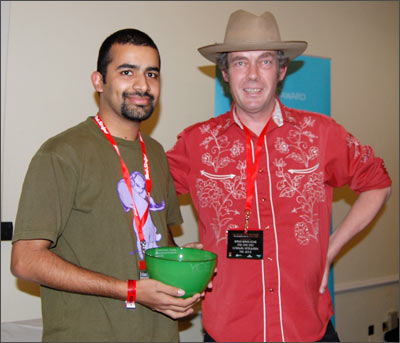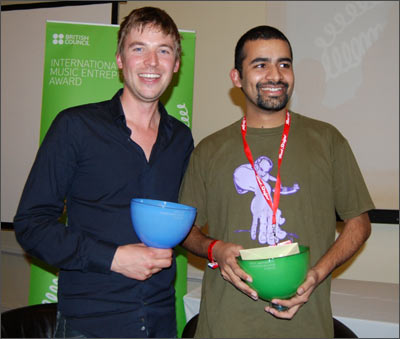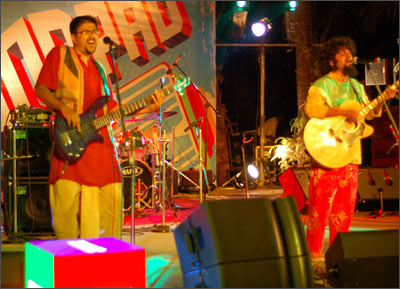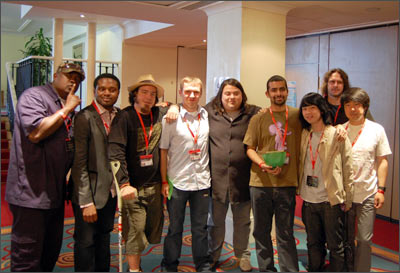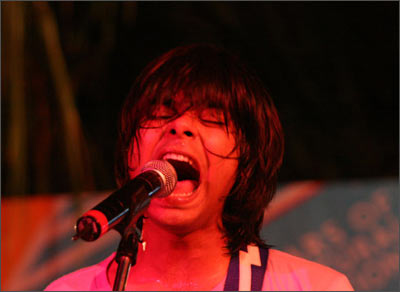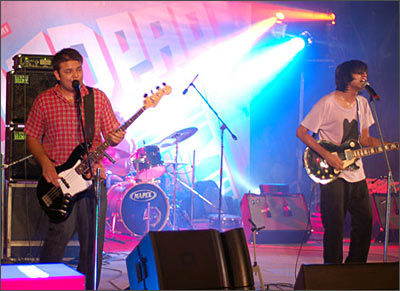 | « Back to article | Print this article |
Meet the man behind India's indie music scene
When you think of a college drop-out who's into heavy metal music, you're likely to conjure up some unflattering images.
But then Mumbai-native Vijay Nair has always been one to defy stereotypes.
For the last seven years, the 25-year-old former commerce student has poured his heart and soul into India's underground music industry, along the way becoming one of the indie scene's best known band managers, festival directors, video producers and record label owners.
And now his hard work is paying off. Literally.
On May 14, Vijay was felicitated in the UK as the British Council's International Young Music Entrepreneur of the year, beating out eight of the world's best and brightest young music entrepreneurs with his highly innovative, sustainable business model, which centres around Only Much Louder and its subsidiaries, all of which Vijay helped to create.
Only Much Louder was the first artist management company for indie bands in India. From OML spawned first Counter Culture Records, a viable distribution option for underground acts with no major label support, and later Babblefish Productions, the video production arm of OML, which aims to give artists a visual identity through music videos, documentaries and podcasts.
Rs 3.5 lakh award
Vijay Nair's presentation to the British Council's panel of judges was 20 minutes long, and consisted of 60 slides, wherein he laid out his understanding of the Indian music market and his vision for the future.
"Vijay gave a superb, creative presentation, which cleverly illustrated and analysed the Indian music market. He is an outstanding entrepreneur, having already achieved a great deal for someone so young, and is buzzing with ideas to further drive his business forward. The judges feel he has the character and potential to make an important contribution to the Indian and wider international music industry," they concluded, before naming him the winner.
His award? Rs 3.5 lakhs (5000 GBP), to be spent on a music-oriented project in India, in collaboration with the British Council.
The nine finalists also were able to take part in a UK tour of the London, Manchester and Brighton music industries, meeting key people, networking and building contacts, promoting music from their own country and jamming to some in live music.
Rediff.com caught up with Vijay, who is still in the UK, enjoying his win and looking forward to the Download Festival in June, a three-day heavy metal tour de force held annually in the UK, where this year bands like Slipknot, Marilyn Manson and Limp Bizkit are on the card.
Excerpts from the interview on the next page...
'Started listening to rock when I was 15 and have been hooked on to it ever since'
Were you always big into music? What bands did you grow up on? What are listening to now? Do you play anything?
Music was hardly a part of my life when I grew up. I guess it was whatever played on Doordarshan for the most part. I started listening to rock when I was 15 and have been hooked on to it ever since. Beirut, Arcade Fire, Bon Iver, Mumford and Sons occupy my playlist these days. As for playing, I have no creative talent whatsoever. I think that helps.
So when did you realise that music could be a career? When did you first taste success?
I never considered [music] as a career. One thing just led to another, and who am I to question! Acquired Funk Syndrome was the first band I managed, followed by Zero, PDV and Pentagram. OML actually started as a hobby. But over the next few years, we evolved into an organised setup with a larger team and many more acts in our roster. Between 2002 and 2005, we managed to set up a solid network of colleges, clubs, promoters who would regularly book indie acts. By 2005, we were booking for over 100 events in a year. Pentagram managed to tour Estonia and Glastonbury and became one of the first Indian bands to break though and establish a footprint in the European market. PDV became the only metal act to perform and headline mainstream college rock festivals. A common thread among all these bands was their commitment to original music, which also became an integral part of OML.
'The best part of the whole tour has been meeting the other contestants'
What was the scene like back then? Was it difficult to make a name for yourself? How have things changed? How has your company grown? What sort of music do you represent -- English or regional languages? Who are some of your big acts?
There was a scene, but there were no managers. It wasn't easy or difficult, it was just new. You had to just carve your own path back then. Now, original music is dominant, which wasn't the case before. That has changed everything -- more gigs, more albums, more labels. It was exciting though. The team began expanding and our luck with finding some of the best people to work with was beginning to surface. We soon set up Counter Culture Records, our own record label and distribution arm. We figured it made sense to start our own label rather than depend on someone else every time. Releasing over 10 albums in the first year, CCR is a testimony to OML's DIY culture and work ethic. Recently, we started operations in Delhi and have recently set up a small office in Bangalore. We hope to be present across the country in major metros. We represent both English and regional language artists. Pentagram, Swarathma, Them Clones, Indigo Children are among the popular acts we work with.
What did you think of the other eight competitors for the British Council's International Young Music Entrepreneur Award?
They were outstanding. It was so good to see the work they are doing in territories that are way tougher than India. And most of us had similar backgrounds which helped us understand each other better. The best part of the whole tour has been meeting the other contestants.
'Piracy is a boon...it creates a buzz'
How did you present your company, Only Much Louder, to the judges? And how did you feel when you won? Were you nervous? What do you plan to do with the money?
I just gave them an honest scenario, I think that helped. I wasn't nervous. But winning was a reminder of the work that still has to be done in India. I have seven projects in mind, but none of them need the money. I am yet to think of a project for it, but you will be the first to know.
So, how can you make money in India with alternative music? Shows? Album sales? Downloads?
It's all live concerts. Albums are mostly just a marketing tool. Piracy is a boon. There is no bootlegging in the Indian scenario, its just 'youtubing', which is great. Piracy creates a buzz. I look at downloaders as committed workers distributing and promoting our music for free, and heck, they don't even charge anything for it.
And what is the market like for your music? Is it only popular in India's big cities, like Bengaluru, Mumbai and Delhi? Or has it music penetrated further?
Depends on what kind of music. Rock is primarily popular in the metros. But bands like Swarathma have broken through smaller markets as well.
'India will always remain Bollywood focussed'
Have AR Rahman's Oscars and the success of Jai Ho helped popularise Indian music in the West? Do you think we'll see continued and increased interest in Indian music?
For sure. The radio plays the Slumdog track more than anything else here still (in the UK). It's a little surreal. I think there will be a lot of interest in India; it depends on how musicians use this opportunity to showcase.
As for the Indian music industry, will it always remain Bollywood-centric? Or will indie, alternative, underground music increase in popularity?
India will always remain Bollywood focussed. But honest grassroots music will always have an audience. The audience will find [the indie music] sooner or later.
What is the Indian music industry's biggest strength? Biggest weakness?
Our biggest strength is our resourcefulness. Our biggest weakness is the mindset which looks at arts as a hobby and not a career.
What can we expect in the future from Vijay Nair? Any big plans?
It's always fun to talk about it after it's done. I'm quite superstitious like that.
